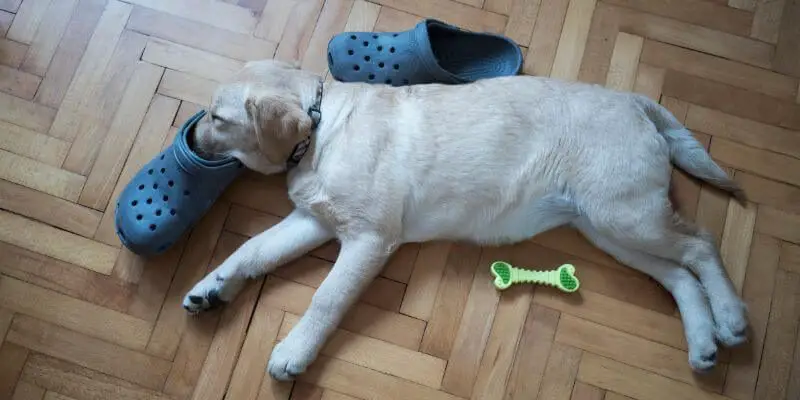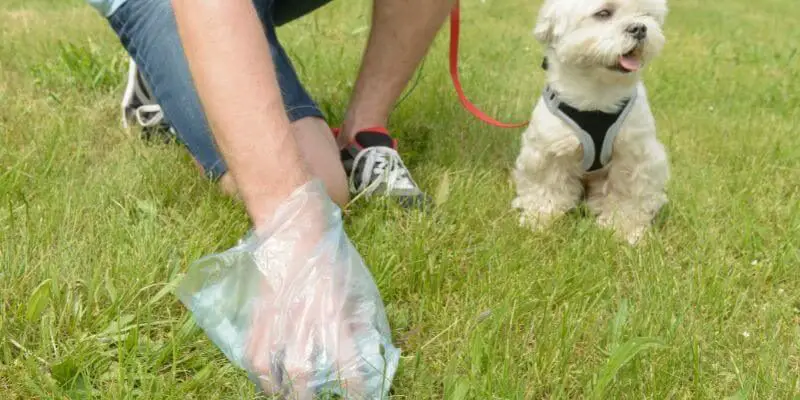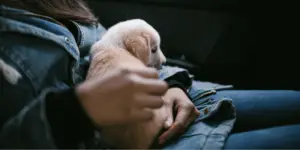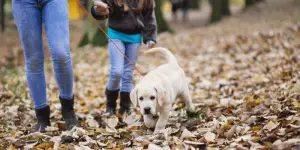
4-Month-Old Puppy Development -What to expect
- Written by Joshua Gordon
- Last updated

Key takeaways
- Continue with your puppy’s training. A 4-month-old pup will know the basics of obedience, socialization, and potty training, but they still have more to learn.
- Decrease your puppy’s daily number of meals. 4-month-old puppies need to be fed between 2 to 3 portions of food a day.
- Make sure your puppy is drinking enough water a day. Puppies require 1 ounce of water per pound of body weight a day.
- Provide your puppy with plenty of chew toys! At 4 months old, puppies will start losing their baby teeth, so they need something to gnaw on when their adult teeth erupt.
In this article
What should your puppy know at 4 months of age?
At 4 months old, your puppy should have fully grasped basic commands like “sit”, “come”, and “stay”. Most puppies should be sleeping in their crate during the night without crying or barking at this age, but it may take some pups a bit of extra time to get used to being crated.
Your puppy should also be able to stay inside their crate for short periods during the daytime, such as when you’re running errands.
Although it may take a couple of months longer for your puppy to completely understand potty training, they should still be making good progress. Accidents should be few and far between as your puppy will now be able to control their bladder.
At this age, your puppy can still only hold their bladder for around 4 hours, so you may still need to take them outside for a toilet break during the night, especially if they are a small breed. However, some dogs may be able to sleep through the urge to urinate.
A 4-month-old puppy should have a fairly good understanding of appropriate house manners, such as staying off the furniture, not jumping up at strangers, and sitting politely before being given a toy or meal.
Lastly, your 4-month-old pup should be doing well with their socialization training. They should have decent on-leash manners and be generally well-behaved in public areas. Your puppy should also be able to patiently greet strangers most of the time, though they may still be a little wary or overly excited with other dogs.

4-month-old puppy sleep schedules
Puppies at 4 months old still sleep a lot more than their adult counterparts, though they will not need as much rest as they did at 8 weeks old. Most pups at this age need around 16 to 19 hours of sleep per day, though this will differ slightly depending on your pooch’s activity level.
Giant breeds like Great Danes and mastiffs tend to need more sleep than toy breeds.
4-month-old puppy feed schedule
A 4-month-old puppy needs between 2 to 3 meals daily, which should be split up across the day. For instance, if your puppy had 3 portions of food daily, feed them once in the morning, once at lunchtime, and once in the evening.
Portion size will vary depending on your puppy’s weight, breed, and activity level, but a general guideline is 20 grams of food per 1 kilogram of body weight.
How much water does a 4-month-old puppy need to drink?
It’s important to make sure your 4-month-old pup is getting enough water each day so they don’t become dehydrated. As a rule of thumb, your pooch should drink 1 ounce of water per pound of body weight.
For example, if your puppy weighs 12 pounds, they’ll need 12 ounces of water daily. There should always be fresh, clean water for your puppy to drink, even at night. You should never restrict your puppy’s access to water as they are more prone to dehydration than adult dogs.
In addition, puppies on a dry food diet need more water a day than those that are fed solely wet food due as dry food has a lower moisture content.
A good way to check whether your puppy is dehydrated is by gently pinching the back of their neck to test the elasticity of their skin (this is called refill capillary time). If your pup’s skin doesn’t spring back into place immediately, it means they are dehydrated.
On the flip side, too much water can do as much harm as too little, so you should always be aware of how much your puppy is drinking each day. Overhydration in puppies can cause symptoms like vomiting, diarrhea, pale gums, bloating, and loss of coordination.
Overhydration can be lethal, especially if your puppy drinks a large amount of water in a short time. It can also be a sign of polydipsia (excessive thirst), which can be caused by diabetes, renal failure, hepatitis diseases, and other medical conditions.
If your puppy’s drinking habits change or you’re concerned about their health, it’s a good idea to book an appointment with your vet
4-month-old puppy teething
Most puppies at 4 months old will begin to lose their deciduous (baby) teeth, but some pups may start to lose them as early as 12 weeks old.
It can be hard work managing a teething puppy, but you’re in the final stretch at this point. Most dogs will stop teething at approximately 6 months old when all their adult teeth have erupted, so you only have a couple of months left to go!
Make sure you have plenty of chew toys for your puppy to gnaw on and keep items that you don’t want to be nibbled on away from your pooch’s reach.

4-month-old puppy training
Hopefully, you have started training your puppy the basics, so continue teaching them simple commands, good house manners, and where to go potty. Some commands your puppy should know are “sit”, “stay”, “no”, and “heel”.
It’s also a good idea to begin working on recall if you haven’t done so already. This will make walking your puppy considerably easier once you’re confident for them to walk off-leash.
As your puppy ages, they’ll be able to learn more complex commands and tricks, though 4 months old is still a little young to expect your puppy to be fully trained.
4-month-old puppy potty training
At 4 months, your puppy should be nearly on their way to being completely housebroken, though it’s normal for them to still have the odd accident or two every now and again.
If your puppy is frequently peeing/pooping in the house, you may need to repeat some of the earlier steps in their training to get them back on track.
4-month-old puppy socialization
Socializing your puppy is an important part of their development as it will shape the type of dog they turn into.
The most crucial window for socialization is between 3 to 16 weeks, so hopefully, you’ve already made a start with getting them used to unfamiliar sights, sounds, and smells.
While you can start socializing your puppy at 4 months old, it will be far less effective than at an earlier age.
Puppy classes are a great way to introduce your pup to other dogs and strangers to help them learn how to behave appropriately.
In addition, while walking your puppy outdoors, you can take them to places where they can encounter things they wouldn’t normally witness at home like busy roads, cyclists, prams/buggies, etc.
Final thoughts
A 4-month-old puppy can do more things than they could at 12 weeks old, but they still have a lot left to learn. It’s important to continue with your puppy’s obedience, socialization, and potty training to help them become a well-mannered, confident adult dog.
References
- https://www.akc.org/expert-advice/puppy-information/why-does-my-puppy-keep-peeing-in-the-house/#:~:text=Remember%2C%20puppies%20can’t%20control,hold%20it%20for%20five%20hours.
- https://ourfamilydog.org.uk/your-new-dog/puppy-stages/your-4-month-old-puppy
- https://www.petmd.com/dog/care/new-puppy-care-6-12-months
- https://www.pupbox.com/training/4month-old/
- https://furbo.com/blog/en/article/what-should-a-puppy-know
- https://www.akc.org/expert-advice/training/puppy-training-timeline-teaching-good-behavior-before-its-too-late/
- https://www.petmd.com/dog/conditions/urinary/c_multi_polydipsia_polyuria
- https://www.akc.org/expert-advice/training/puppy-socialization/

Written by: Joshua Gordon
Head of Research and Editorial, Joshua has over 7 years of experience as a finance and automotive research consultant. He is a childhood pet owner and dog enthusiast.









